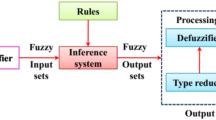Abstract
Wireless sensor networks are deployed in complex and uncertain environments, and multiple objectives of routing algorithms are expected to be optimal. However, routing algorithms based on deterministic single objective optimization may not flexibly meet the above needs of applications. This paper adopts fuzzy random optimization and multi-objective optimization, introduces fuzzy random variables to describe both fuzziness and randomness of link delay, link reliability and nodes’ residual energy, and proposes a routing model based on fuzzy random expected value and standard deviation model. A hybrid routing algorithm based on fuzzy random multi-objective optimization is designed, which embeds fuzzy random simulation into genetic algorithm with Pareto optimal solution. Simulation results show that the presented algorithm, by adjusting the parameters of fuzzy random variables for depicting both fuzziness and randomness, achieves a longer lifetime and wider performances of delay, latency jitter, reliability, communication interference, energy and balanced energy distribution. Therefore, the presented algorithm can meet different application needs of the cluster head network in the two-tiered wireless sensor networks.




Similar content being viewed by others
Explore related subjects
Discover the latest articles, news and stories from top researchers in related subjects.References
Al-Karaki JN, Ul-Mustafa R, Kamal AE (2009) Data aggregation and routing in wireless sensor networks: optimal and heuristic algorithms. Comput Netw 53(7):945–960
Bari A, Wazed S, Jaekel A, Bandyopadhyay S (2009) A genetic algorithm based approach for energy efficient routing in two-tiered sensor networks. Ad Hoc Netw 7(4):665–676
EkbataniFard GH, Monsefi R, Akbarzadeh-T MR, Yaghmaee MH (2010) A multi-objective genetic algorithm based approach for energy efficient Qos-routing in two-tiered wireless sensor networks. In: Proceedings of the 5th IEEE international symposium on wireless pervasive computing (ISWPC 2010). pp 80–85
Gen M, Cheng R, Wang D (1997) Genetic algorithms for solving shortest path problems. In: Proceedings of the IEEE international conference on evolutionary computation (ICEC’97). pp 401–406
Gogu A, Nace D, Dilo A, Meratnia N (2011) Optimization problems in wireless sensor networks. In: Proceedings of the international conference on complex intelligent and software intensive systems (CISIS 2011). pp 302–309
Gomez J, Gil C, Banos R, Marquez AL, Montoya FG, Montoya MG (2012) A Pareto-based multi-objective evolutionary algorithm for automatic rule generation in network intrusion detection systems. Soft Comput. doi:10.1007/s00500-012-0890-9
Hao FF, Liu YK, Wang S (2008) The variance formulas for triangular fuzzy random variables. In: Proceedings of the international conference on machine learning and cybernetics. pp 612–617
He S, Chen J, Xu W, Sun Y, Thulasiraman P, Shen X (2010) A stochastic multiobjective optimization framework for wireless sensor networks. EURASIP J Wirel Commun Netw. doi:10.1155/2010/430615
Liu B, Liu YK (2002) Expected value of fuzzy variables and fuzzy expected value models. IEEE Trans Fuzzy Syst 10(4):445–450
Liu YK, Liu B (2003a) A class of fuzzy random optimization: expected value models. Inf Sci 155(1–2):89–102
Liu YK, Liu B (2003b) Fuzzy random variables: a scalar expected value operator. Fuzzy Optim Decis Mak 2(2):143–160
Lu J, Wang X (2012) Fuzzy random expected value model based multi-objective optimization routing for wireless sensor networks. In: Proceedings of the 3rd international conference on quantitative logic and soft computing (QLSC 2012). pp 215–222
Minhas MR, Gopalakrishnan S, Leung VCM (2009) Multiobjective routing for simultaneously optimizing system lifetime and source-to-sink delay in wireless sensor networks. In: Proceedings of the 29th IEEE international conference on distributed computing systems workshops (ICDCSW ’09). pp 123–129
Mohemmed AW, Sahoo NC, Geok TK (2008) Solving shortest path problem using particle swarm optimization. Appl Soft Comput 8(4):1643–1653
Rubio-Largo A, Vega-Rodrguez MA, Gomez-Pulido JA, Sanchez-Perez JM (2012) A multiobjective approach based on artificial bee colony for the static routing and wavelength assignment problem. Soft Comput. doi:10.1007/s00500-012-0887-4
Sengupta S, Das S, Nasir M, Suganthan PN (2012) Risk minimization in biometric sensor networks: an evolutionary multi-objective optimization approach. Soft Comput. doi:10.1007/s00500-012-0906-5
Wang XM, Lu JL, Li YS, Hao KG (2011) Multiconstrained multipath routing for wireless sensor networks in the fuzzy random environment. Chin J Comput 34(5):779–791 (in Chinese)
Wen F, Lin C (2010) Multiobjective route selection model and its soving method based on genetic algorithm. Int J Inf Syst Logist Manag 5(2):1–8
Yuan B, Orlowska M, Sadiq S (2007) On the optimal robot routing problem in wireless sensor networks. IEEE Trans Knowl Data Eng 19(9):1252–1261
Zitzler E, Thiele L (1999) Multiobjective evolutionary algorithms: a comparative case study and the strength Pareto approach. IEEE Trans Evol Comput 3(4):257–271
Acknowledgments
The research is supported by the National Natural Science Foundation of China under Grant Nos. 60970054, 61173094 and 61373083, the Scientific Research Foundation for the Returned Overseas Chinese Scholars, State Education Ministry, and the Fundamental Research Funds for the Central Universities of China under Grant No. GK201302024.
Author information
Authors and Affiliations
Corresponding author
Additional information
Communicated by L. T. Koczy.
Rights and permissions
About this article
Cite this article
Lu, J., Wang, X., Zhang, L. et al. Fuzzy random multi-objective optimization based routing for wireless sensor networks. Soft Comput 18, 981–994 (2014). https://doi.org/10.1007/s00500-013-1119-2
Published:
Issue Date:
DOI: https://doi.org/10.1007/s00500-013-1119-2




